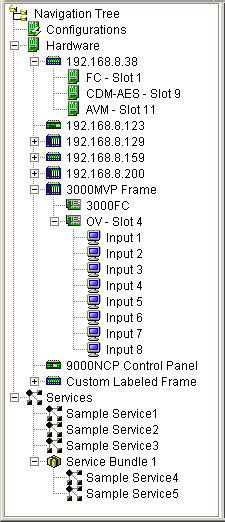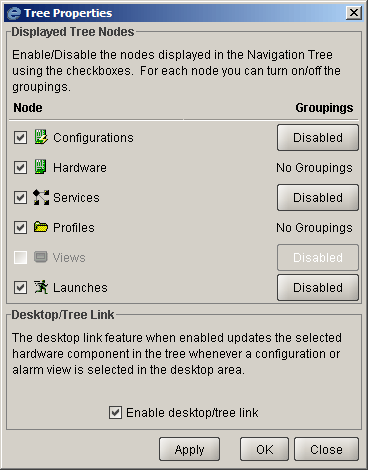

The Navigation Tree is located on the left side of the VistaLINK™ PRO window. The navigation tree displays super-nodes and sub-nodes which organize the VistaLink enabled hardware found by the system and displays all Evertz VistaLINK™-enabled products found on the network (see Discovery Subsystem, Automatic Discovery). Nodes with a plus sign beside them can be expanded to expose underlying elements and similarly, nodes with a minus sign can be collapsed to hide unwanted information. Each node in the Hardware View has an associated icon that indicates the type and alarm state of the hardware device. For the VistaLink PRO Standard and Monitor Client applications there are five super-nodes under which all other nodes will appear. The Navigation Tree super-nodes are as follows:
 Configurations (can
contain sub groupings)
Configurations (can
contain sub groupings)
All user created System configurations will be displayed under this Navigation
Tree super-node.
 Hardware
Hardware
All hardware devices that are auto discovered or entered manual will appear under this super-node. The Hardware super-node can contain any of the following hardware node types:
Frame nodes, denoted by the icons ( 

 )
)
Network Control Panel nodes, denoted by the icon
- 
Module nodes, denoted by the icons -  ,
, 
Video
nodes, denoted by the icon - 
 Services
(can contain sub groupings)
Services
(can contain sub groupings)
User created Services will appear under this Navigation Tree super-node. The Services super-node can contain any of the following Service node types.
User created Service,
denoted by the icon - 
User created Service
group, denoted by the icon - 
 Launches
(can contain sub groupings)
Launches
(can contain sub groupings)
User created Launches (executable / http) will appear under this Navigation Tree super-node. The Launches super-node can contain any of the following Launches node types.
User created Launches,
denoted by the icon - 
User created Launches
group, denoted by the icon - 
 Profiles
Profiles
Profiles that have been created using the VistaLink PRO AutoConfig Client will appear under this Navigation Tree super-node.
User created Alarm
Profiles, denoted by the icon
- 
User created Schedule
Profiles, denoted by the icon - 
Super-Node Groups
The Configurations, Services, and Launches super-nodes can all contain sub Groups to aid in organizing the Navigation Tree nodes into logical groups. Super-node grouping can be enabled or disabled on a per super-node basis by accessing the Tree Properties dialog.
Each of the Navigation Tree super-nodes can be displayed in the any of the following state conditions (colors), representing the current alarm state of the hardware device.
None, OK (normal state)
Green (self corrected alarm indication)
Red, Critical alarm
Orange, Major alarm
Yellow, Minor alarm
Dark Gray, Warning alarm
Light Gray Text, Disabled (No longer responding)
For more information on alarm states see “Alarm Indication”.
The Navigation Tree Properties dialog allows the user to customize the super-nodes will appear in the Navigation Tree. Select Tree -> Properties from the main menu to open the Navigation Tree Properties dialog or right click the Navigation Tree super-node and select -> Properties.

Navigation Tree super-nodes that support Groups allow grouping to be enabled or disabled by clicking the associated button. The button text will indicate if groups are currently enabled or disabled for a displayed super-node.
Desktop/Tree Link
When the Desktop/Tree Link option is active selections made in the Client working areas will cause the tree selection focus to follow.